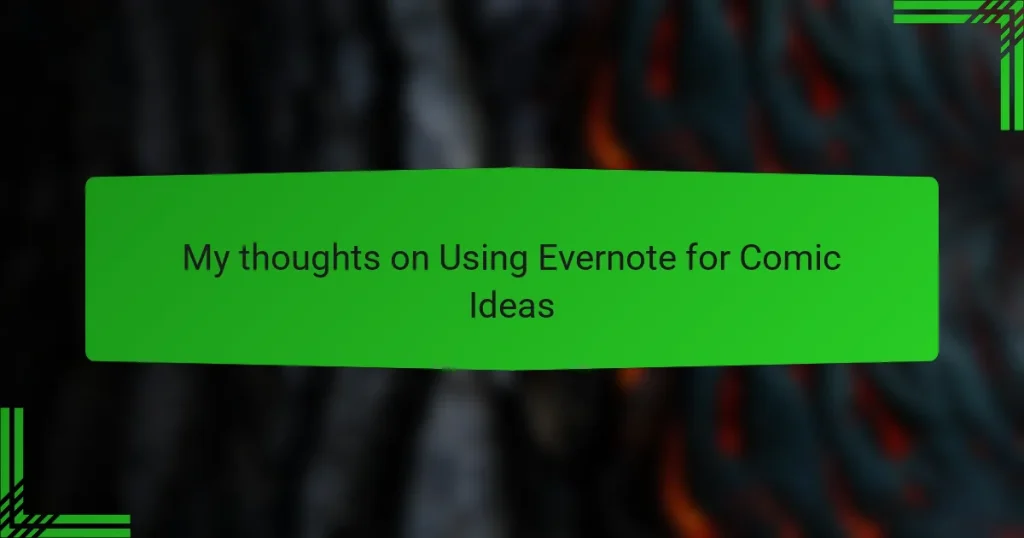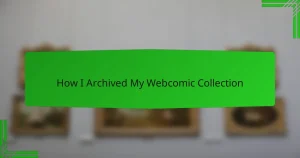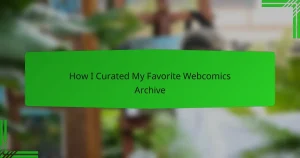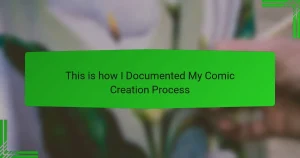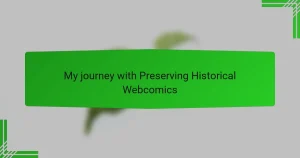Key takeaways
- Webcomics archives are crucial for creators and fans, offering a space for inspiration and community collaboration.
- Organizing ideas using tools like Evernote enhances creativity, making it easier to retrieve and refine concepts.
- Evernote features such as notebooks, tags, and web clipper significantly improve comic planning and accessibility compared to traditional methods.
- Regular reflection, setting deadlines, and collaborating with peers are effective strategies for managing comic ideas and maintaining creative momentum.
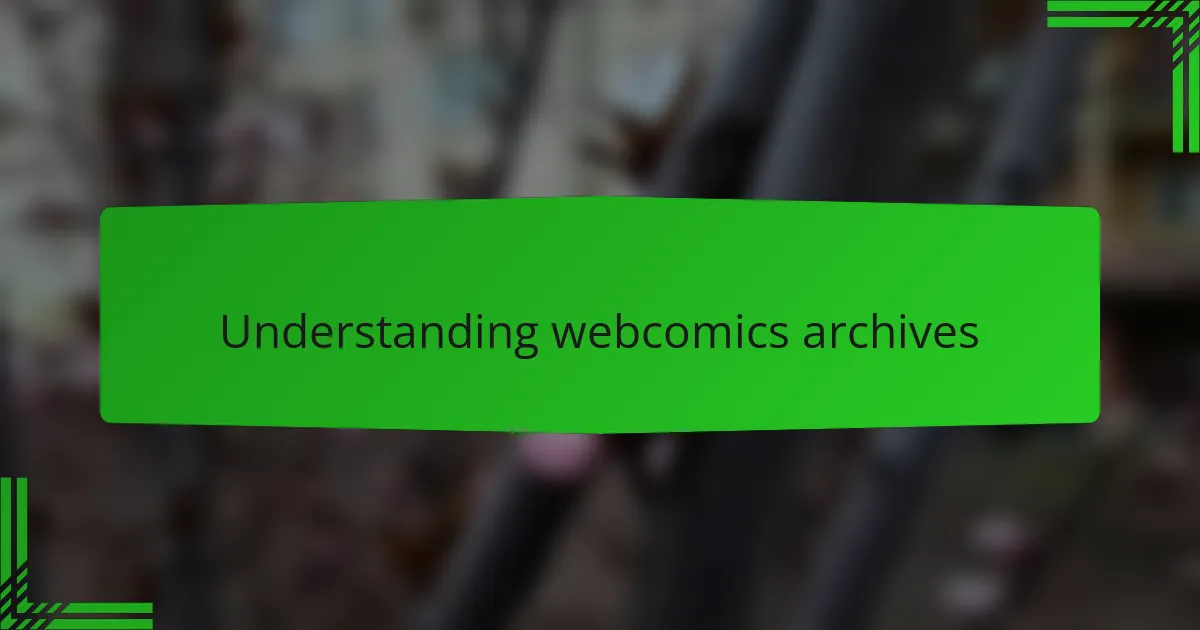
Understanding Webcomics Archives
Understanding webcomics archives is essential for both creators and fans alike. They serve as a repository for diverse comic styles, stories, and inspirations that can spark new ideas. I remember flipping through old archives and discovering gems that not only entertained me but also influenced my creative process.
In my experience, having access to a well-organized webcomics archive allows for an enriching exploration of not just popular titles but also hidden treasures. It’s like digging through a treasure chest filled with stories waiting to be told. Each comic I find can ignite a new idea, leading to countless possibilities for my work.
When creators document their ideas and inspirations within these archives, it fosters a sense of community and collaboration, crucial for growth in the webcomic field. Here, I can reflect on the evolution of my art, seeing how past influences shaped my current style.
| Type of Archive | Accessibility |
|---|---|
| Public Archives | Free access; open to anyone |
| Private Archives | Membership-based or creator-specific access |
| Curated Collections | Expertly selected works, often with commentary |
| User-generated Archives | Community-driven; varying quality and organization |
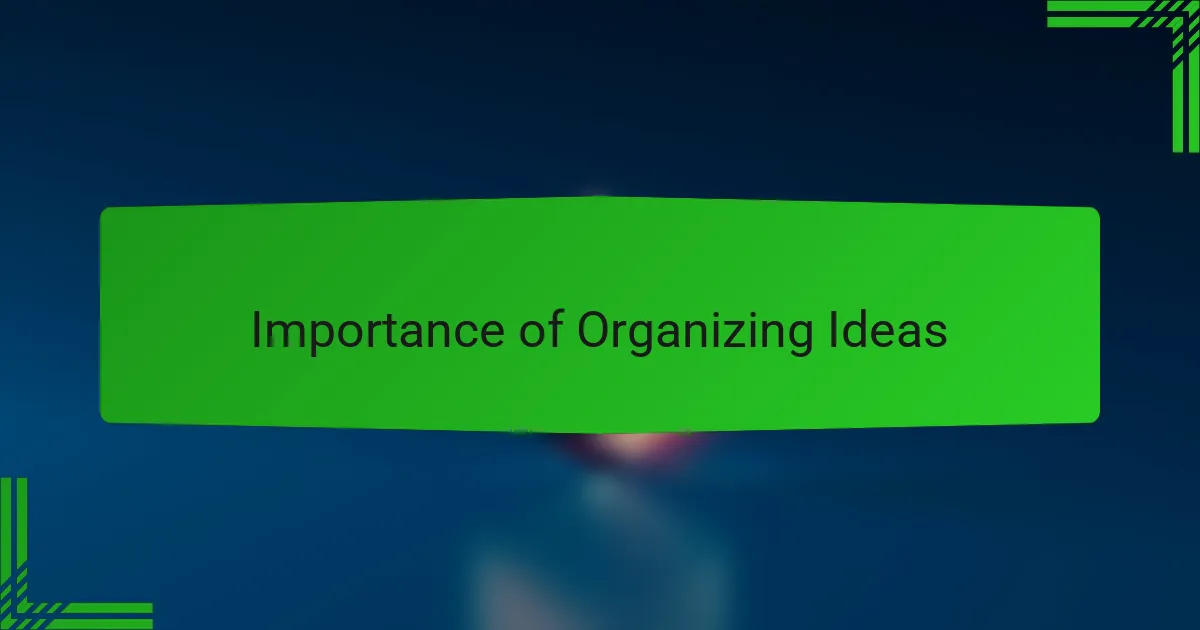
Importance of Organizing Ideas
When it comes to creating webcomics, organizing ideas is crucial. I often find that a chaotic mind can lead to lost creativity and missed opportunities. Having a system, such as Evernote, helps me capture those fleeting thoughts before they vanish.
I remember a time when I jotted down a comic idea on a napkin and instantly lost it. That experience taught me the importance of having a centralized place to save all my sketches, jokes, and plot outlines. With organized ideas, I can easily access and refine them, making the whole creative process much smoother.
Using Evernote allows me to categorize different comic concepts efficiently, so I can always find inspiration when I need it. The way I create is directly tied to how well I organize my thoughts.
| Aspect | Organized Ideas | Unorganized Ideas |
|---|---|---|
| Creativity Flow | Smooth and consistent | Chaotic and sporadic |
| Idea Retrieval | Easy access | Time-consuming |
| Focus | High concentration | Frequent distractions |
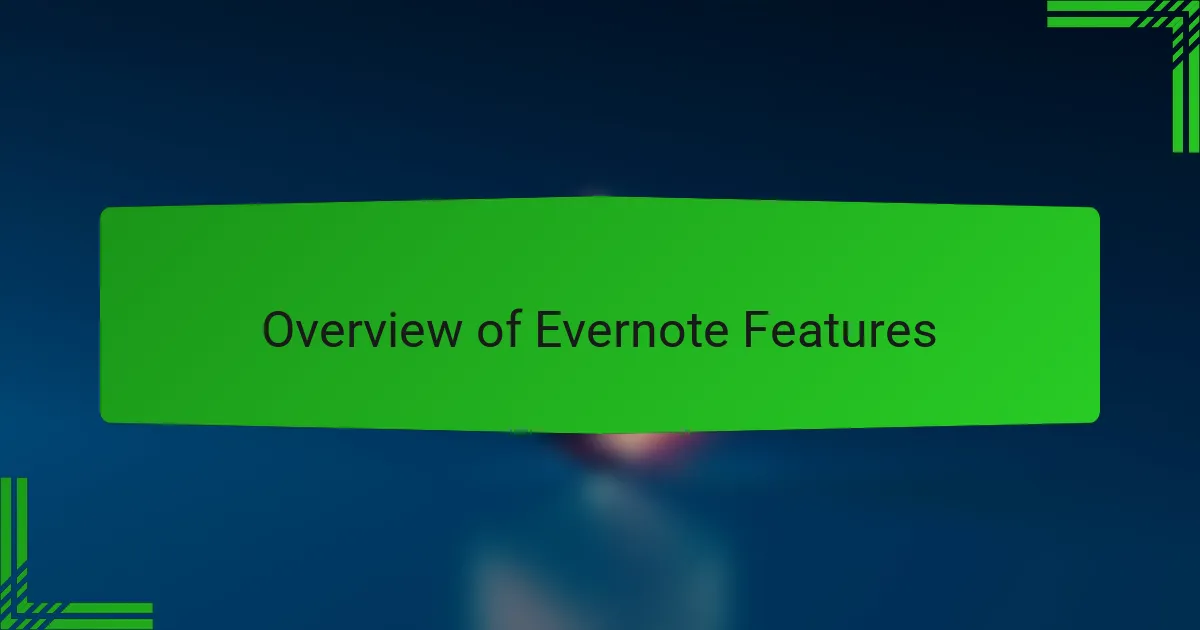
Overview of Evernote Features
Evernote is a versatile tool that I’ve found to be incredibly helpful for organizing my comic ideas. The ability to create notebooks and tags allows me to categorize my thoughts easily, which makes retrieval a breeze. I can also insert images, sketches, and even audio notes, making it a dynamic space to brainstorm and flesh out concepts.
One feature I particularly appreciate is the web clipper, which lets me save articles and inspiration directly from my browser. This helps me capture ideas on the go, so I never lose that spark of creativity. Additionally, the syncing feature ensures that my notes are accessible across all my devices, keeping my inspirations at my fingertips whenever they arise.
Here’s a quick comparison of some key Evernote features that I think are particularly valuable for comic creators:
| Feature | Description |
|---|---|
| Notebooks | Organize notes by project or theme for easy access. |
| Tags | Categorize notes for better searchability and organization. |
| Web Clipper | Save web pages, articles, and images to gather inspiration. |
| Syncing | Access notes from any device, ensuring ideas are always within reach. |
| Attachments | Add images, sketches, and audio to enrich your notes. |
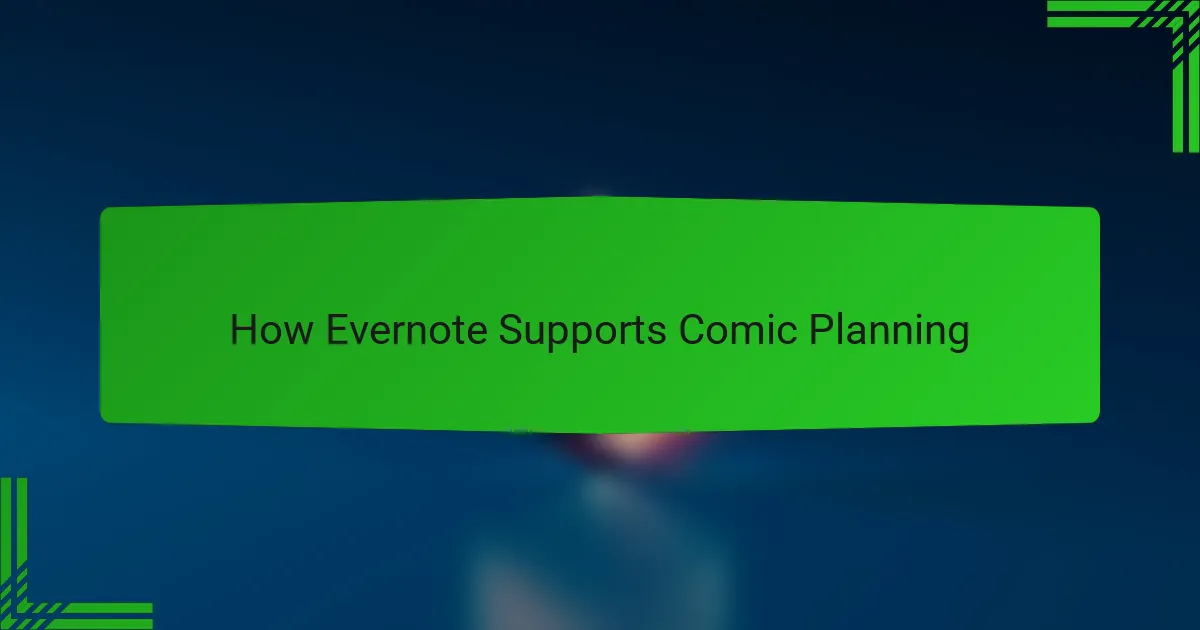
How Evernote Supports Comic Planning
Using Evernote for comic planning has been a game-changer for me. The app’s ability to organize my ideas seamlessly allows me to maintain a clear vision for each project. I often find myself capturing spontaneous bursts of inspiration, whether it’s a character sketch or a plot twist, knowing they will be easy to find later.
Another fantastic feature is the ability to create checklists. When working on a new comic, I can outline each step, ensuring I cover all my bases from character development to final edits. This structured approach not only keeps me on track but also diminishes that overwhelming feeling that often accompanies creative projects.
Below is a simple comparison of how Evernote stacks up against traditional methods of comic planning:
| Feature | Evernote | Traditional Method |
|---|---|---|
| Accessibility | Available on multiple devices, easy to access anywhere | Limited to physical notebooks, harder to carry around |
| Organization | Tags and notebooks for easy sorting | Requires manual sorting, can be cluttered |
| Collaboration | Share notes with others for feedback | Harder to collaborate, requires physical exchange |
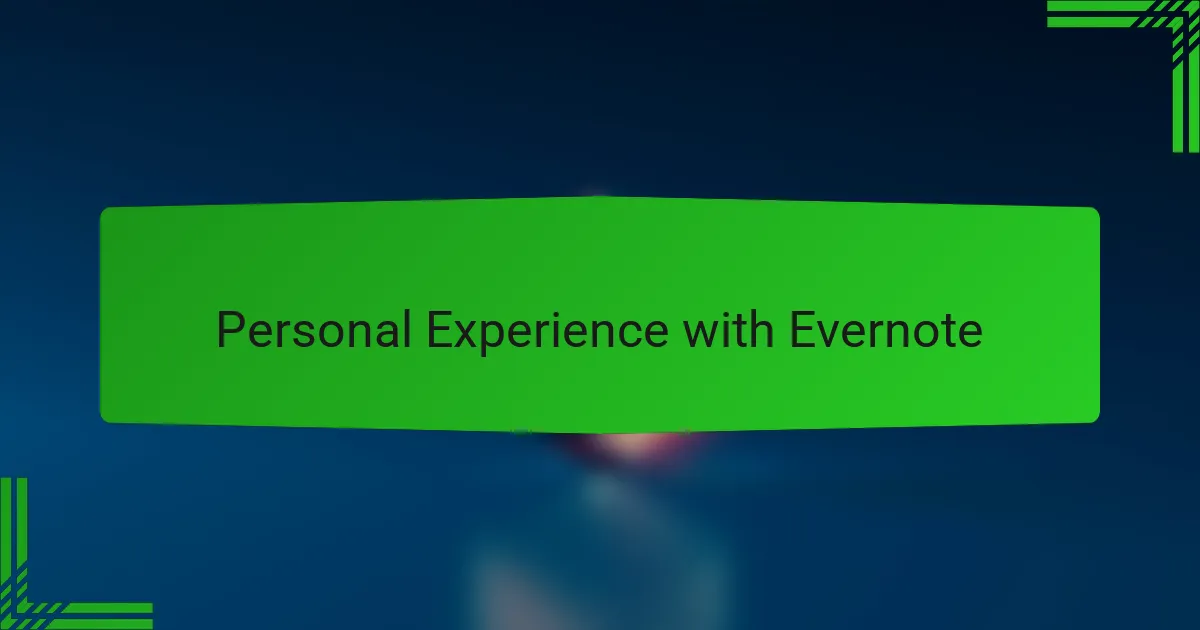
Personal Experience with Evernote
Using Evernote has fundamentally reshaped how I approach brainstorming comic ideas. One of my favorite moments was when I was sitting in a café, and a brilliant plot twist hit me out of nowhere. I quickly opened Evernote, typed it in, and felt an immense sense of relief knowing I wouldn’t forget it. I think everyone can relate to that pulse of inspiration that comes unexpectedly, right?
There have been times when my notes felt overwhelming, with so many ideas buzzing around in my head. However, Evernote allowed me to organize those thoughts neatly. I recall a particularly chaotic period when I transitioned between projects, and being able to categorize different concepts into dedicated notebooks made everything more manageable. It transformed the chaos into something I could actually tackle.
One feature I didn’t expect to love was the ability to add sketches and photos. I often find myself incorporating visual elements into my notes, which enhances my ideas. I remember sketching a character while brainstorming and quickly snapping a photo to attach it. It’s moments like these that bring my creative journey to life, blending art and notes into a cohesive flow.

Tips for Effective Idea Management
When managing comic ideas, I’ve learned that regular reflection is key. I often set aside time each week to review my notes and assess which ideas resonate with me the most. This practice not only clarifies my vision but also helps me prioritize concepts that align with my creative direction. Have you ever looked back at old notes and rediscovered ideas you had forgotten? It’s like finding a lost treasure that can reignite your passion.
Another tip I find invaluable is setting deadlines for developing certain ideas. I tend to get excited about multiple concepts, which can lead to a buildup of unfinished thoughts. By assigning specific time frames for each project, I’m able to focus my energy and maintain momentum. This structure keeps my creative tension high and reduces the temptation to overthink or second-guess myself.
Lastly, collaborating with fellow creators has enriched my idea management. I regularly share my Evernote notes with trusted peers for feedback. This exchange of ideas can spark new directions I hadn’t considered. When was the last time you bounced ideas off someone? It’s truly inspiring to see how a simple conversation can morph an initial thought into something extraordinary.
